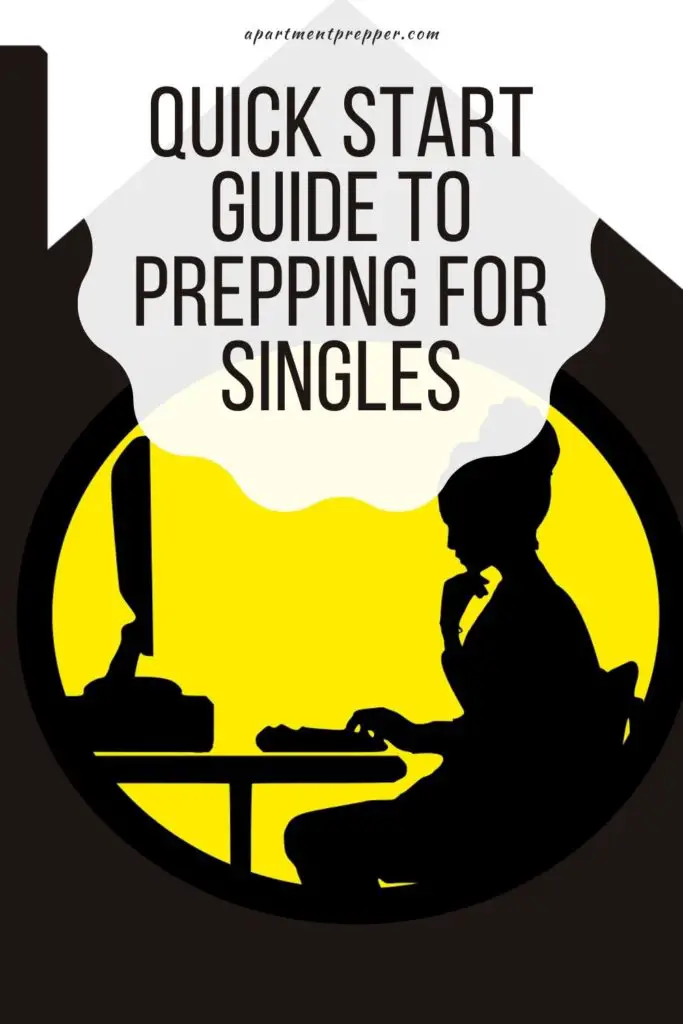Written by Bernie Carr
Recently, I received a question on Facebook about prepping tips for singles. I’ve written about this before, but it was a long time ago, well before the pandemic.
Single people need about the same things as everyone else, but there are both challenges and opportunities. If you live alone, you’ll need to allow for extra security and communications. One the other hand, you don’t have to worry about getting someone else’s opinion, such as a partner who may be against prepping. You get to decide when you’ll prep and what you want to stock up.
Here are the priorities for prepping:
Water
Water is one of the most basic needs – you can survive just three days without water. Save a gallon per day, and allow for more if you have pets. Just pick up an extra gallon of water each time you shop. Start with three days worth of water, then aim for a week or more.
Have a backup water filter. In Houston, we experienced many “boil water” emergencies when the water pump in the neighborhood got damaged and the water from the tap became contaminated and came out brownish. It happened at some of the apartments I’ve lived in, some days it wasn’t even during a disaster. That’s why I started using a Berkey water filter on a regular basis. If you just need a small water filter, a good portable one is the Survival Filter Pro.
Food
Build your emergency food supply by spending just $5-10 a week to buy extra food that you normally eat. Include canned food, pasta, sauce, prepared soups, ramen noodles, rice, beans, granola bars, crackers, and other foods that are easy to prepare. Don’t forget to include coffee or tea, snacks or other comfort foods – they can help you cope during a stressful time. If you have extra funds, include freeze dried foods as they are easy to prepare. If not, just continue buying normal foods that you’d eat anyway. Make sure you note the expiration date with a sharpie so you can use them up before they expire. You can also eat these emergency foods if you have a “normal” emergency such as coming down with the flu or COVID-19 symptoms and you need to self-isolate.
What if the power goes out?
If your electricity goes out in a disaster, eat your perishable fridge foods such as milk, cheese, deli meats. Here’s a guide on what to do with refrigerated foods after a disaster.
Storage location
One issue that may affect single preppers is lack of storage space. Ideally, food storage should be in a cool, dark place, away from heat or sunlight. Do not store foods in the garage, as the heat during the summer will cause foods to degrade quickly. If you are short on space, find storage elsewhere in your home besides the kitchen. I store foods in 5-gallon buckets in my closet.
Hygiene
We already saw a toilet paper shortage occur during the early days of the COVID-19 pandemic. If you are well-stocked you don’t need to worry about running out in the event of a short-term shortage. Just pick up a few extra rolls every time you shop. Besides TP, include other hygiene items such as soap, shampoo, toothpaste, tampons or sanitary napkins, face masks, antiseptic wipes, disposable gloves, bleach, trash bags.
First Aid
During the early days of the COVID-19 pandemic, hospital emergency rooms were overrun with new patients. The same thing can happen during a disaster. You’ll need a well-stocked first aid kit to take care of minor injuries. Include your extra supplies of your personal prescriptions, extra pair or eyeglasses or contact lenses, contact lens supplies, asthma inhalers, and any other medical supplies that you rely on. It’s a good idea to also include a Survival Medicine Handbook you can look up first aid techniques in case your internet connection is down.
Power outage supplies
If power is out, you’ll need lighting and backup energy sources. Stock up on flashlights, battery powered lanterns, batteries, candles and matches. You’ll need a backup way to cook food such as a propane stove. For additional ways to prepare for a power outage, click here.
Communication
You’ll need a way to keep track of the news as well as get in touch with family or friends. A battery operated weather radio that also serves as a flashlight and portable power bank is a multi-use item that can come in handy. I keep multiple power banks to make sure I can charge my mobile phone when the power is out.
Cash
Set aside emergency cash in your home and your car so you have a way to pay for goods or gas when electronic payment methods are down. Try to keep at least $40 emergency cash, or more if possible.
Safety
Safety is a priority if you live by yourself. Make sure your doors and windows are secure. Learn about various ways you can defend yourself, depending on your own comfort level. Whatever you choose, the weapon should be easily accessible and you must know how to use your weapon. Keep a low profile. Be selective about information you reveal to others about yourself, don’t advertise that you live alone.
Start now
Don’t get overwhelmed if you are just getting started. Just take small steps starting today. Have a goal of having at least three days worth of supplies, then increase from there. Once you have at least a week’s worth, you’ll feel a lot more secure about your ability to prepare and take care of yourself.
If you found this article interesting or helpful, please consider helping us out (without costing you anything)! We are an affiliate of Amazon.com, which means we received a small commission if you click through one of our Amazon links when you shop, at totally no cost to you. This helps keep the lights on at the blog. Thanks!
Bernie Carr is the founder of Apartment Prepper. She has written several books including the best-selling Prepper’s Pocket Guide, Jake and Miller’s Big Adventure, The Penny-Pinching Prepper and How to Prepare for Most Emergencies on a $50 a Month Budget. Bernie’s latest e-book, FRUGAL DIY has just been released on Amazon. Her work appears in sites such as the Allstate Blog and Clark.com, as well as print magazines such as Backwoods Survival Guide and Prepper Survival Guide. She has been featured in national publications such as Fox Business and Popular Mechanics. Learn more about Bernie here.
Image by mohamed Hassan from Pixabay




Regarding power outages, check out “Olive Oil Lamps &c.” It’s Book 2 of The Non-Electric Lighting Series (written by yours truly) and is available on Amazon both as a paperback and as a Kindle ebook. It describes and illustrates some 15 different designs of homemade lamps that burn vegetable oil. Of the 8 books in the series, this is probably the most useful in an emergency situation — especially if you’re caught away from home (and away from your stockpile of preps) when the lights go out. TIP: Don’t just read the book. Try a few things up close and personal, ahead of time, to see what works best for you. https://www.amazon.com/gp/product/B00KB7F9SU/ref=dbs_a_def_rwt_bibl_vppi_i5
Hi Ron, Thanks for bringing up a useful resource for a power outage emergency.